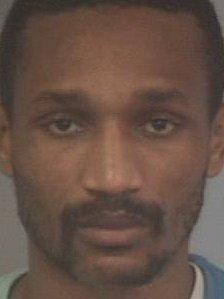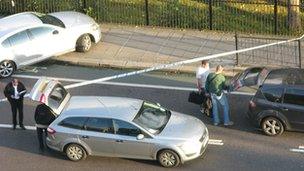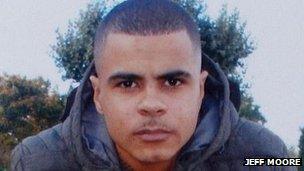Hutchinson-Foster case shines light on Duggan shooting mystery
- Published

Kevin Hutchinson-Foster had denied providing Mark Duggan with a gun
When police shot dead a 29-year-old man, Mark Duggan, in Tottenham last summer it led to the worst riots in England for a generation. The circumstances of the shooting have been shrouded in mystery.
But over the past month a trial has opened a window, for the first time, on the events leading up to, and immediately after, the controversial shooting.
A jury has failed to reach a verdict on whether a friend of Mark Duggan, Kevin Hutchinson-Foster, supplied him with the handgun which police say he was holding when they shot him dead.
On 4 August 2011, the Met's gang crime unit, Trident, had Mark Duggan under surveillance.
They followed him as he made his final journey, by minicab, across North London.
He knew he was being followed. He sent a text message to a friend which read: "Watch our for a green VW van. It's Trident. dey jus jammed me."
It was alleged in court that in Leyton the cab stopped and Kevin Hutchinson-Foster handed Mark Duggan a shoebox with a gun inside. But although Hutchinson-Foster pleaded guilty to possessing an illegal handgun and using it in an assault a week earlier, he denied meeting Mark Duggan on 4 August and supplying him with the weapon.
In Tottenham, firearms officers from CO19 carried out a "hard stop" on the cab and within seconds Mark Duggan had been shot twice.

Police sealed off the area in Tottenham where Mark Duggan was shot
In the immediate aftermath it was reported that Mark Duggan had fired at police. He hadn't. There was also a failure to liaise properly with relatives of Mark Duggan after the death.
Tempers frayed in Tottenham, and by 6 August a protest at the shooting became a riot. That fireballed into four days of unrest and looting in cities across England.
The trial of Kevin Hutchinson-Foster has provided more detail about the shooting than ever before heard in public. And during it the police account - that Mark Duggan was holding a gun when shot - was questioned.
For the first time, the jury heard:
The CO19 officer who shot dead Mark Duggan said Mr Duggan emerged from the minicab with a gun, took a couple of steps and raised it as if to fire
But another officer, the first to reach him as he fell to the ground, said he could find no gun either on or under Mark Duggan's body In a statement after the shooting, he didn't say that Mr Duggan was holding a gun. He only mentioned when he gave a fuller statement later, and when he gave evidence in court
Police say they found the gun about 12ft away, on the other side of railings from where Mark Duggan fell. An expert witness told the court that the gun could not have landed there if Mark Duggan, when shot, was pointing it at police.
Mark Duggan's fingerprints were found on the shoebox allegedly used to carry the gun, but neither his prints nor his DNA were found on the gun itself or the sock
A woman who lived close to the scene gave evidence which contradicted the police. "Miss J" told the court she saw officers pulling the body of Mark Duggan from inside the cab and placing it on the pavement. She said she later saw an officer emerging from the back of the minicab, holding a handgun in his upturned hand, before he wrapped it in a black cloth and put it inside an evidence bag
Eleven police witnesses to the shooting spent eight and a half hours writing their statements in the same room of CO19 HQ a few days after the incident. Officers told the court that they had followed Association of Chief Police Officers guidelines, which allowed them to confer on what each of them had done during the shooting, but not what thoughts guided their actions
The officers refused interview requests by the Independent Police Complaints Commission. Several of them did, however, give evidence during this trial
The lead IPCC investigator, Colin Sparrow, said he was unaware of the existence of a crucial piece of evidence - the shoebox - until a week after the shooting. Police officers said it was found in the passenger footwell of the car. The jury heard that when an IPCC investigator finally saw the box, a week later, it was in the boot of the car
Kevin Hutchinson-Foster admitted possessing an illegal handgun a week before the Duggan shooting and using it to beat a Hackney barber during an argument over a woman. But the jury was unable to agree on whether he had later given Mark Duggan the gun.

Mark Duggan's death sparked a riot in Tottenham and then to days of unrest across England
The question remains as to whether or not Mr Duggan was armed and the police shooting justified?
Ed Brown QC, for the prosecution, told the jurors that it was not their job "to decide one way or the other the rights or wrongs of the shooting of Mark Duggan. That is a task properly left to an inquest."
More than a year after the riots, we know much more about the killing that triggered them. But today's failure to reach a verdict on the man accused of providing the gun at the centre of the Mark Duggan killing has done very little to settle the debate.
- Published1 October 2012
- Published3 October 2012
- Published28 September 2012
- Published27 September 2012